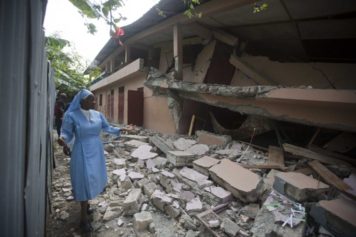The president of the U.N. Security Council says members unanimously support Secretary-General Ban Ki-moon’s recommendation to reduce the U.N. peacekeeping force in Haiti while concentrating on strengthening the national police.
Ban recommended that the council reduce the mission’s military strength from 6,270 troops by withdrawing 1,070 infantry and engineering personnel by June 2013.
The news comes as the U.N. prepares to formally extend its mandate in Haiti sometime next week. Guatemala’s U.N. Ambassador Gert Rosenthal told reporters after a council meeting Wednesday that he expects members to approve a resolution extending the Haiti mission for a year.
Rosenthal said council members recognize that Haiti’s new government “seems to be working in a very coherent manner.”
Mariano Fernandez Amunategui, the U.N. envoy to Haiti, told the council the security situation is stable and political violence has disappeared.
Security Council delegations and staff were recently in Haiti to begin planning for the eventual end of a U.N. peacekeeping mission (MINUSTAH) that first began following a devastating earthquake that rocked the country in 2004.
MINUSTAH’s current mandate runs through October 15, 2012.
Some observers had worried that the absence of the U.N. forces would leave a security vacuum that would be ripe for exploitation by armed gangs.
But maintaining the international force on the Caribbean island country for any additional lengthy period could prove equally as difficult, given the strong wishes of the Haitian public to see foreign troops leave its soil and the desires of mission’s donors and the troop-supplying countries who all want an end to the mission.
Improving the Haitian police force so that it is capable of preventing outbreaks of lawlessness is a necessary start before international troops will leave.
MINUSTAH was formed in 2004 to keep a polarized Haiti from disintegrating into a violent civil war. It has shared in the tragic loss of life from the country’s catastrophic 2010 earthquake that has been blamed for a cholera epidemic that has caused more than 7,000 deaths and sickened 500,000.


